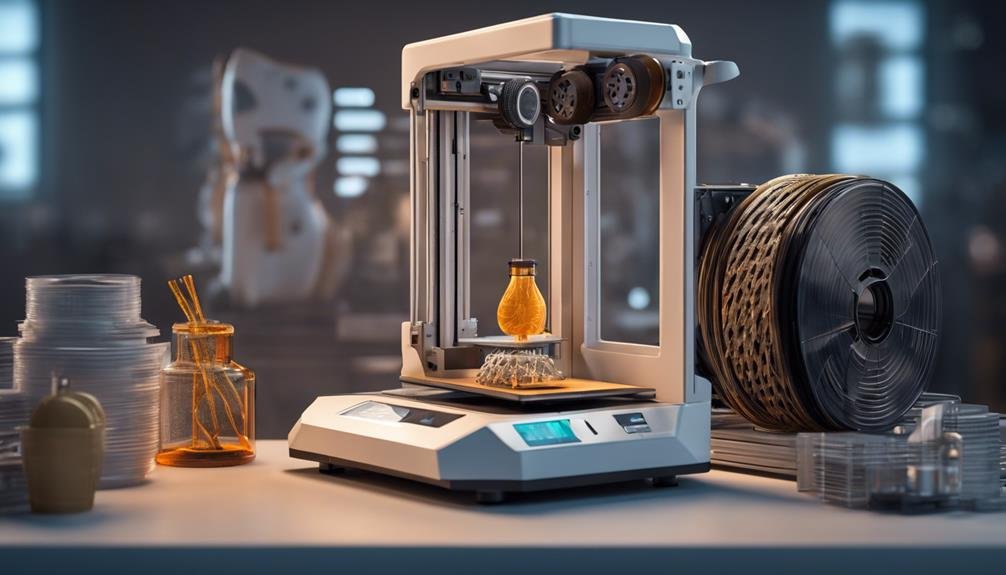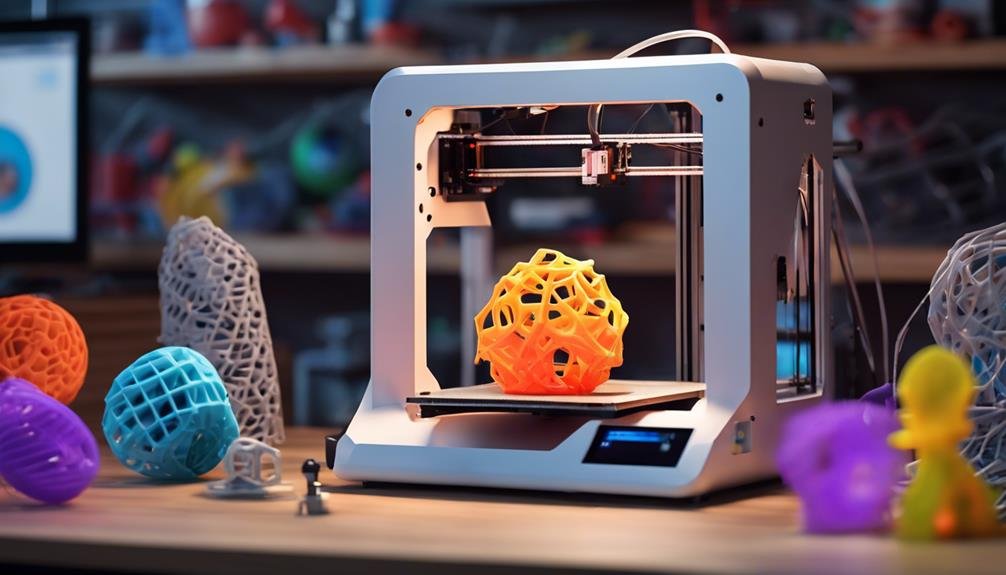As you embark on selling 3D printed items, it's important to understand that understanding copyright laws, intellectual property rights, and licensing restrictions is vital to avoid legal consequences and ensure compliance with online marketplace policies. You'll need to obtain necessary permissions and licenses, respecting licensing restrictions on 3D models and seeking permission from original creators. Failure to comply can result in legal action. To guarantee success, familiarize yourself with online marketplace rules and regulations, optimize production efficiency, and grasp market demand. By doing so, you'll be well on your way to building a successful business, and with further exploration, you'll uncover the nuances of turning your hobby into a thriving enterprise.
Understanding 3D Printing Laws
When selling 3D printed items, you must navigate a complex web of copyright laws and licensing restrictions to avoid legal repercussions. As a seller, you need to understand that intellectual property rights are a vital aspect of 3D printing. Without permission from the original creator, you risk infringing on their copyright, which can lead to legal consequences.
To avoid this, you must obtain a copyright license or seek permission from the creator before selling 3D printed items based on their designs. Moreover, you need to comply with licensing restrictions, which may limit commercial use of the printed items. Failing to do so can result in legal action, damaging your reputation and business.
To guarantee legal compliance, it's important to follow platform policies and attribution guidelines when selling 3D printed items online. By taking these steps, you can avoid legal issues and focus on growing your business. Remember, understanding intellectual property laws and adhering to licensing restrictions are key to selling 3D printed items successfully.
Legal Considerations for Sellers
As you venture into the world of selling 3D printed items, you'll need to confront the legal considerations that come with playing in the intellectual property arena, where one misstep can lead to costly consequences.
When selling 3D printed items, you must make sure you have the necessary permissions and licenses to avoid copyright infringement. This means seeking permission from the original creator or obtaining a license that allows you to sell derivative works, giving credit to the original creator.
Understanding the terms of the license is important, as it outlines the specific rights and restrictions attached to the intellectual property. Failure to comply can result in legal action, so it's important to educate yourself on the legal implications of selling 3D printed items. Resources like Law Stack Exchange can provide valuable insights to help you navigate the legal landscape.
Intellectual Property and 3D Printing

You must navigate the complex landscape of intellectual property laws to make sure that your 3D printed items don't infringe on existing copyrights or trademarks.
As you venture into selling 3D printed items, it's crucial to understand the intricacies of intellectual property.
When selling 3D printed items, you must guarantee you're not infringing on existing copyrights or trademarks. This includes respecting licensing restrictions on 3D models, which can be protected by a Creative Commons license, for instance.
Failure to do so can lead to copyright infringement, resulting in legal complications. To avoid such issues, seek permission from the original creator before selling 3D printed items.
Additionally, be cautious when creating derivative works based on copyrighted designs, as this can also lead to legal issues.
Remember, selling unauthorized 3D printed items can result in costly consequences, extending beyond the original license terms.
To guarantee a smooth and successful selling experience, familiarize yourself with the rules and regulations of online marketplaces like eBay, Amazon, and Facebook Marketplace before listing your 3D printed items. Understanding the platform policies will help you avoid issues with your account and ensure compliance with intellectual property laws. Make sure to include all necessary information in the listing description according to the platform's guidelines.
| Platform | Key Requirements |
|---|---|
| eBay | Verify authenticity of 3D printed items, comply with intellectual property policies |
| Amazon | Follow guidelines for commercial use of 3D printed objects, respect intellectual property rights |
| Facebook Marketplace | Adhere to community standards, ensure accurate listing descriptions |
Turning Your Hobby Into a Business

Shifting your 3D printing hobby into a profitable venture requires a strategic shift from personal projects to commercial production, where market demand, pricing, and efficiency take center stage. As you evolve from hobbyist to entrepreneur, you'll need to pinpoint your target audience, delve into niche markets, and create a business plan to establish a successful 3D printing business.
This involves grasping market demand, setting competitive prices, and optimizing production efficiency to guarantee profitability. Building a brand, marketing your products online or through local channels, and providing excellent customer service are key elements of a thriving 3D printing business.
You'll need to adapt to market trends, invest in new technologies, and continuously improve your products and services to stay competitive. By turning your hobby into a business, you can sell 3D printed items that meet the demands of your target market, while maintaining a profitable and efficient operation.
With a solid business plan and a focus on production efficiency, you can turn your passion for 3D printing into a lucrative venture.
Frequently Asked Questions
Can I 3D Print Stuff and Sell It?
When you 3D print stuff to sell, you'll need a solid business strategy, ensuring quality control and considering liability concerns, all while preserving creative freedom, and maneuvering online platforms' policies to avoid legal issues.
Is Selling 3D Printed Items Profitable?
When you start selling 3D printed items, you'll find that profitability depends on balancing startup costs with profit margins, understanding market trends, conducting thorough competition analysis, and implementing savvy pricing strategies to stay ahead of the competition.
Is There a Market for 3D Printed Items?
You're wondering if there's a market for 3D printed items? Yes, there is! Market trends show rising consumer demand for unique gifts and niche products, which online platforms like Etsy and Shapeways cater to.
Is It Legal to 3D Print and Sell Pokémon?
You can't legally sell 3D printed Pokémon items without licensing from Nintendo, as it's a copyright infringement, violating their intellectual property rights, unlike fan art laws, making it a risky venture for gaming collectibles enthusiasts.
Conclusion
Now that you've navigated the complexities of 3D printing laws and intellectual property, you're ready to turn your hobby into a business.
To guarantee success, familiarize yourself with online marketplaces' rules and regulations, and stay up-to-date on changing laws and regulations.
By doing so, you'll be well on your way to selling 3D printed items with confidence, avoiding potential legal pitfalls and building a thriving business.